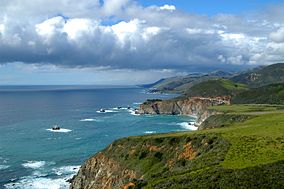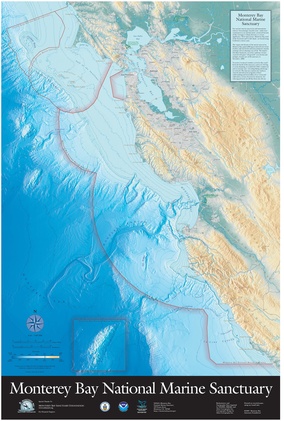He's now in California:
And the footage has been spectacular:
The Monterey Bay National Marine Sanctuary is the largest in the United States:

Big Sur coastline looking north to Bixby Canyon Bridge. Monterey Bay National Marine Sanctuary.
| |
| Map of the sanctuary |
Welcome to Monterey Bay National Marine Sanctuary! One of our nation's most spectacular marine protected areas, Monterey Bay National Marine Sanctuary offers some of the best wildlife viewing in the world! This "Serengeti of the Sea" stretches along the central coast from San Francisco to Cambria and includes pristine beaches, jewel-like tide pools, lush kelp forests, steep canyons and an offshore seamount teeming with life—from tiny shrimp to giant blue whales. The National Marine Sanctuary System promotes environmental protection, stewardship and ocean research. We invite you to explore and help protect this national undersea treasure.
Hugh Fearnley-Whittingstall has also been campaigning for Marine Conservation Zones along the UK's coasts:
Lyme Bay has only two small MCZs:
Sustainable fishing is practiced in the Bay:
However, the protection actually given is limited:
Meanwhile, there has been pressure on the UK government to protect the waters around its overseas territories:
At the stroke of a pen Britain can save our waters
Conservationists call for the creation of some of the largest marine reserves in the world
Our precious oceans are under severe threat. By polluting our waters, and plundering our marine resources through unsustainable and often illegal fishing, humanity is causing irreparable harm to aquatic life.
What can we do to make a difference? The answer lies close to home. By creating marine reserves in some of our most environmentally significant waters we can do a huge amount to save unique marine environments from extinction.
Ultimately, it's a matter of winning over the human population:
.
.
.


No comments:
Post a Comment